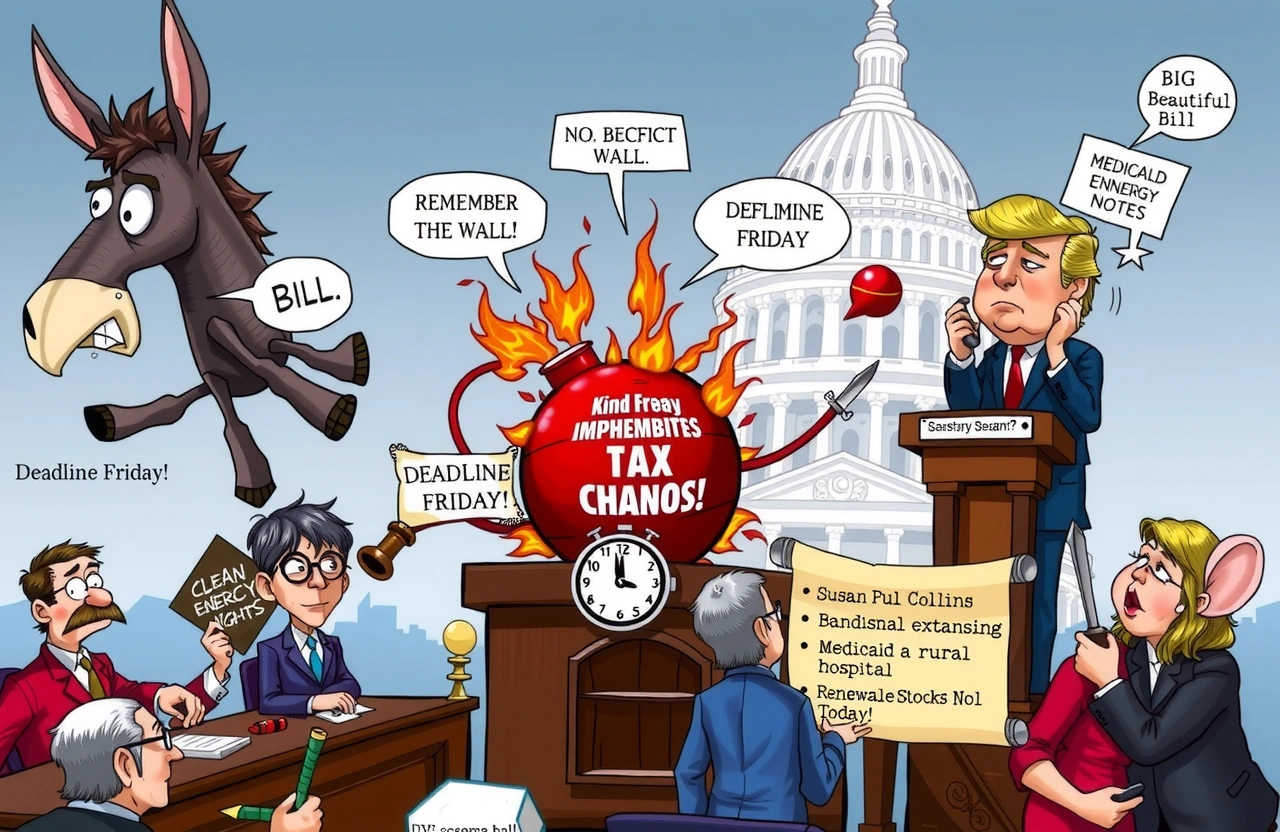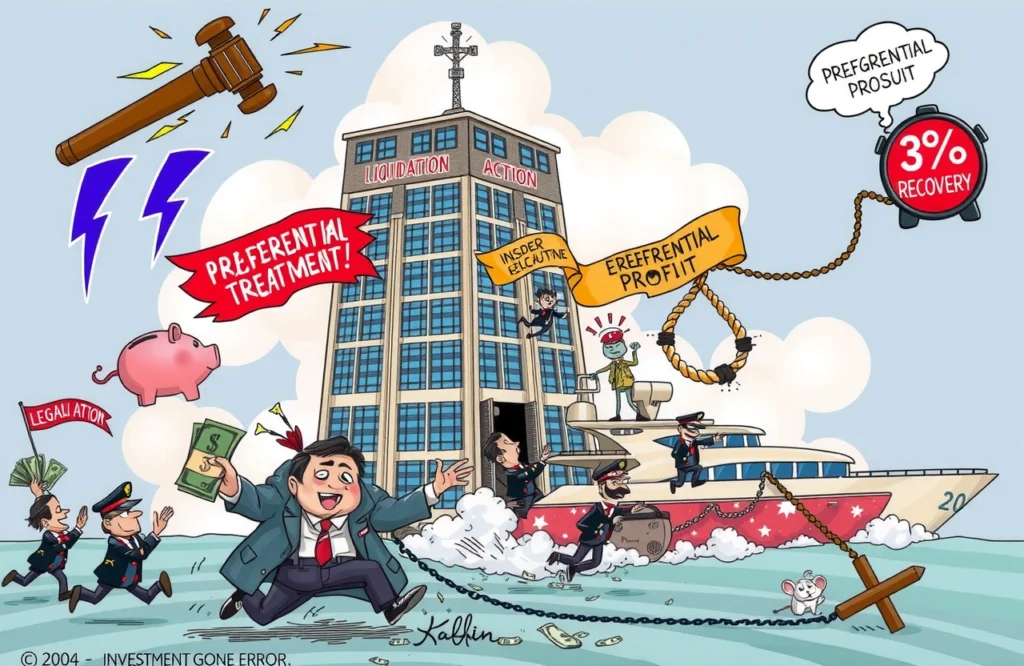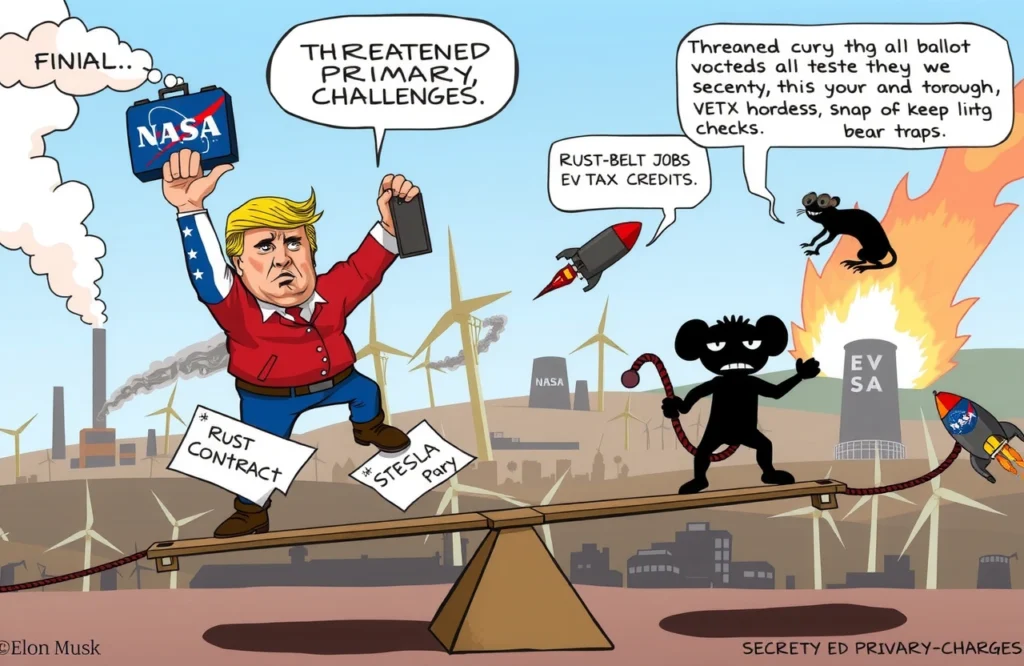The Legislative Impasse
Tensions within Republican ranks reached boiling point this week when Senate leadership abruptly suspended proceedings on President Trump’s landmark ‘Big Beautiful’ legislation. With vote counters reporting at least eight potential GOP defections exceeding the party’s narrow three-vote margin for error, Majority Leader John Thune (约翰·图恩) ordered colleagues home for urgent negotiations. The action stalls essential fiscal reforms initially framed as urgent priorities.
Senators will reconvene Tuesday to parse dozens of pending amendments that have become battlegrounds for opposing party factions. At stake: a sweeping package affecting tax policy, clean energy subsidies, healthcare provisions, and deficit projections exceeding $1.2 trillion according to Congressional Budget Office analysis. Despite heavy White House pressure from Treasury Secretary Besant and Trump personally lobbying wavering senators, GOP lawmakers remain polarized over core provisions.
The Big Beautiful bill’s path reveals fundamental Republican divisions regarding economic philosophy. While establishment leadership pushes for broad legislative achievement before elections, fiscal hawks demand deeper cuts, while moderates resist imposing austerity policies on critical healthcare and energy sectors. This three-way fracture resulted in Tuesday’s unprecedented pause after marathon voting sessions failed to establish consensus.
The Senate Vote Math
Republicans hold 53 Senate seats versus Democrats’ 47, requiring almost perfect party discipline given unanimous Democratic opposition. Vice Presidential intervention remains unlikely since Kamala Harris wouldn’t break ties when procedures paralyzed. Current projections indicate firm opposition from:
- Rand Paul (兰德·保罗) of Kentucky
- Thom Tillis (汤姆·提利斯) of North Carolina
Six other Republican senators have substantive policy reservations complicating whip operations. With McConnell needing minimal defections, the current eight-vote deficit creates mathematical gridlock.
The Amendment Battleground
Senate rules mandate exhaustive amendment consideration before final bill votes, creating countless arenas for Republican infighting. This procedural vulnerability transforms routine policymaking into high-intensity hostage negotiations where factions leverage power through controversial modifications.
The Republican divisions become most visible as senators propose competing amendments reflecting party tensions:
Clean Energy Subsidy Showdown
Senator Joni Ernst’s proposed amendment seeks modifications to clean energy subsidies generating intense controversy:
- Current bill requires project completion by 2027
- Ernst amendment permits partial credits for projects breaking ground in 2026-2027
- Estimated cost: $28 billion additional deficit impact
”Wind energy provides reliable royalties to Iowa farmers,” Ernst explained during floor debate. ”Penalizing projects over administrative timelines hurts rural economies.” Fiscal conservatives immediately denounced the measure, threatening defections if expansion occurs according to Senate aides speaking anonymously.
Contradictory Healthcare Amendments
Healthcare provisions sparked parallel contradictory amendments deepening Republican divisions:
- Susan Collins (苏珊·柯林斯) amendment doubles rural hospital funds ($50B) funded by 39.6% tax on incomes above $25 million
- Ron Johnson (罗恩·约翰逊) amendment repeals Obamacare Medicaid expansions entirely
Democrats successfully blocked Collins’ proposal, while Johnson’s amendment hangs precariously. Senator Ron Wyden (罗恩·怀登) dismissed Collins’ approach as ”putting Band-Aids on amputation wounds.” If Medicaid repeal advances however, Collins and moderates like Lisa Murkowski (丽莎·穆尔科斯基) pledged opposition to the entire Big Beautiful bill.
White House Counteroffensive
Administration officials launched urgent rescue operations against legislative collapse. President Trump personally called Republican fencesitters Monday evening, providing presidential guarantees regarding petroleum restoration provisions while issuing stark warnings via Truth Social:
Failure to pass this historic legislation guarantees devastating tax increases! We NEED Republicans United!
Treasury Secretary Besant spent Tuesday negotiating subsidy compromises aiming to appease Senator Ernst without triggering fiscal conservative revolts. ”We believe margins exist if senior colleagues recognize necessity,” Besant told journalists in Capitol corridors.
Contrasting sharply with administration confidence, Majority Leader Thune admitted: ”We’re undergoing iterative collaboration processes.” When pressed about prospects late Monday, his noncommittal responses revealed leadership awareness regarding fragility.
Democrats Spotlight Republican Chaos
Democratic Leader Chuck Schumer (查克·舒默) capitalized on Republican disarray during scheduled press availability: ”Republicans paralyzed themselves today because their bill simultaneously attacks seniors’ healthcare while subsidizing polluters.” Party strategists confirmed preparing ‘‘party incapable of governing’’ messaging anticipating failure.
The Policy Fault Lines
Medicaid Expansion Under Fire
The Big Beautiful bill’s proposed $300 billion Medicaid cuts generated surprising rural Republican resistance extending beyond traditional Democratic opponents:
- 112 rural hospitals facing closure risks according to American Hospital Association analysis
- Expanded subsidies failed assuring representatives like Idaho’s Mike Simpson
”Simply replacing coverage with temporary funds ignores underlying instability,” argued Senator Jerry Moran (堪萨斯州) during procedural debates. Expanding Republican divisions threatens passage despite White House promises revising formulas affecting vulnerable districts.
Deficit Hawk Resistance
The $1.2+ trillion projected deficit expansion caused Freedom Caucus aligned Senators including Mike Lee (犹他州) and Lindsey Graham (林赛·格雷厄姆) delivering ultimatums demanding deeper offsets:
- Requiring $435 billion revenue offsets
- Insisting faster sunset clauses
- Demanding Social Security changes
”We campaigned restoring fiscal responsibility,” Lee reminded colleagues privately according to notes shared anonymously. ”This legislation backtracks catastrophically.”
The Endgame Strategy
Senate leaders prepare complex reconciliation procedures transcending ordinary amendments if Republicans cannot bridge policy differences:
The Safety-Net Amendment Plan
The Republican leadership acknowledged preparing ultimate ”safety-net amendment” packaging multiple pledges simultaneously before recall votes potentially beginning Wednesday:
- Accelerating promised deficit mitigation commissions
- Side agreements softening Medicaid impacts regionally
- Commencing fossil-fuel subsidies ahead projections
Securing Senator Johnson’s vote requires compromises influencing healthcare provisions without alienating moderates like Collins and Alaska Senator Lisa Murkowski. Sources confirm Thune considering scheduling simultaneous votes eliminating contradictions reducing Republican divisions.
The House Problem
Even Senate passage initiates secondary complications, since House Republicans passed signature tax language requiring renewed reconciliation:
- House previously approved companion bill via thin 217-216 vote
- Senate version imposes deeper healthcare reimbursement reductions
- New York Representative Nick LaLota (尼克·拉洛塔) announced opposition due restricting state/local tax deductions
Freedom Caucus members already signaled demands exceeding Senate appetite, with Perry (宾夕法尼亚州) warning: ”Spending growth undermines core Republican principles.”
The Crucial Countdown
The suspended Big Beautiful bill deliberation enters make-or-break phase:
- Senate Majority Leader Thune promised renewed voting commencing Tuesday morning
- Administration committed pursuing votes concluding Wednesday
- Agricultural subsidies sunset automatically Friday without extensions included
The compromise window narrows as Republican divisions fragment legislative priorities. Leadership sources suggest Senators Johnson and Collins remaining pivotal, with obstruction guarantees collapsing entire legislative frameworks.
The suspended Big Beautiful bill process encapsulates Washington’s chaotic legislative environment. Policy ambitions shattered under realities governing fragmented parties unable reconciling competing visions. Outcomes remain uncertain despite accelerating deadlines affecting markets, planning cycles, and macroeconomic positioning.
The Pathway Forward
Five critical indicators worth monitoring:
- Clean energy amendment negotiations guided by Secretary Besant
- Medicaid compromise contours addressing rural concerns
- Deficit hawk demand thresholds expressed Thursday
- Senator Johnson and Collins’ finalized voting positions
- House Republican Leader Scalise’s coalition assurances
Financial markets reacted cautiously Tuesday midday:
- Renewable energy stocks declined 3.5% sector-wide
- Hospital operators Trade below projections
- Regional banking indexes stabilize awaiting resolution
Broader Implications
Beyond immediate legislative consequences, this Republican divisions crisis reveals deeper faultlines requiring longer-term adjustment:
- Successful parties pass legislation overcoming internal disputes
- Government instability compromised signature pledges
- Republican fractures signal primary vulnerabilities
Seeking achievable compromise resembles walking legislative tightropes – lean excessively toward deficit hawks loses moderates; favor establishment priorities confronts rebellions securing nomination procedures. Such tensions paralyze governance absent leadership effectively reconciling contradictory ambitions.
The suspended Big Beautiful bill signifies more fundamentally than procedural delay – it showcases partisan fragility undermining collective achievements possible merely 18 months ago. Should legislators fail navigating compromises presently, credibility implications extend beyond Washington into upcoming electoral battlefield positioning.
The Senate suspension requires urgent resolution demonstrating governmental functionality restoring citizen confidence increasingly skeptical Washington-based commitments matching ambitions.
Monitor Senate debate unfoldings minute-by-minute informing investment positioning accordingly. Contact representatives conveying preferences while legislative outcomes remain malleable. Elections increasingly become referendums regarding legislative effectiveness transcending partisan symbolism exclusively. Return governing consistency requiring overcoming Republican divisions permanently.




